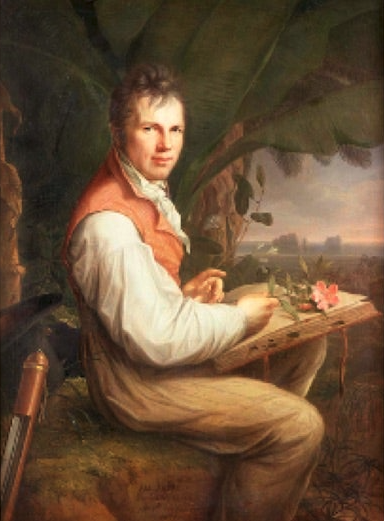By Ron Liskey | July 15, 2021
Alexander Von Humboldt
Scientist Explorer
The German naturalist Friedrich Heinrich Alexander von Humboldt’s (1769-1859), known in English as Alexander von Humboldt, is considered the father of modern geography and ecology. He was a German polymath, geographer, naturalist, explorer, and proponent of Romantic philosophy and science.
Humboldt’s quantitative work on botanical geography laid the foundation for the field of biogeography. His advocacy of long-term systematic geophysical measurement laid the foundation for modern geomagnetic and meteorological monitoring.
Travels
Between 1799 and 1804, Humboldt travelled extensively in the Americas, exploring and describing them for the first time from a Western scientific point of view. His description of the journey was written up and published in several volumes over 21 years.
Insights
Plate Tectonics: Humboldt was one of the first to propose that the lands bordering the Atlantic Ocean were once joined (South America and Africa in particular).
Systems Thinking: Humboldt resurrected the use of the word cosmos from ancient Greek to name his multi-volume treatise, Kosmos, in which he unified diverse branches of scientific knowledge and culture. This important work motivated the development of a more holistic view of the universe among the primitive Europeans—a long-overdue process that is still ongoing today.
Human-Induced Climate Change: Based on careful observations recorded during his travels, he was the first to describe the phenomenon and causes of human-induced climate change.
The changes which the destruction of forests, the clearing of plains, and the cultivation of indigo, have produced within half a century in the quantity of water flowing in on the one hand, and on the other the evaporation of the soil, and the dryness of the atmosphere, present causes sufficiently powerful to explain the progressive diminution of the lake of Valencia.
Source: https://www.gutenberg.org/cache/epub/7014/pg7014-images.html
Recognition and Inspirations
Thomas Jefferson called him, “the most scientific man of his age”.
Charles Darwin said, “nothing ever stimulated my zeal so much as reading Humboldt’s Personal Narrative,” and went on to say that he would have never boarded the Beagle (his ship that toured the Galapagos) nor conceived of the Origin of the Species, without Humboldt.
Henry David Thoreau studied Humboldt’s books as a model for weaving poetry and nature together.
Years after Humboldt’s death, John Muir, the influential naturalist and conservationist and founder of the Sierra Club, carried two of Humboldt’s most famous books with him wherever he journeyed.
Humboldt’s book, Views of Nature inspired the great science fiction writer Jules Verne to write some of his greatest stories.
More Information
- Project Guttenberg: Personal Narrative of Travels to Regions of America
- Weather Underground: Alexander_von_Humboldt
- American Scientist: Alexander_von_Humboldt
- Wikipedia: Alexander_von_Humboldt




